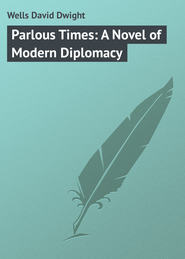По всем вопросам обращайтесь на: info@litportal.ru
(©) 2003-2024.
✖
Her Ladyship's Elephant
Настройки чтения
Размер шрифта
Высота строк
Поля
"You are my Consul, and under the circumstances my national protector; I can't do without you."
"I am not at all sure that her ladyship will see it in that light; but, as you say, it is better than nothing, and our position can't be worse than it is at present."
"Then it is agreed we stand by each other through thick and thin?"
"Exactly," he replied, and shook her extended hand. At this moment the train came in, and they returned to the carriage.
Lord Cowbray did not put in an appearance, and they were soon under way for Melton Court, which was some miles distant from the town. By the time they entered the grounds it was quite dark, and they could only see that the park was extensive, and that the Court seemed large and gloomy and might have dated from the Elizabethan period.
On entering the central hall they at once saw evidences of a large house-party, whose presence did not tend to put them more at their ease, and Mrs. Scarsdale lost no time in sending a message to Lady Melton, to the effect that her great-niece had arrived unexpectedly and would much appreciate a few words with her in private.
They were shown into a little reception-room, and the footman returned shortly to say that her ladyship would be with them soon. After what seemed an endless time, but was in reality barely fifteen minutes, their hostess entered. She was a fine-looking woman of sixty or over, with a stern, hard face, and a set expression about her thin lips, that boded little good to offenders, whatever their age or sex. She looked her guests over through her gold eye-glasses, and, after waiting a moment for them to speak, said coldly:
"I think there is some mistake. I was told that my niece wished to see me."
"I said your great-niece," returned Mrs. Scarsdale.
"Oh, my great-niece. Well? I do not recognise you."
"It would be strange if you did, Lady Melton," returned the bride, "as you've never seen me. I am the wife of your great-nephew, Harold Stanley Malcolm St. Hubart Scarsdale."
"I do not see your husband present," said her ladyship, directing an icy glare at the unfortunate Consul.
"No," replied her niece, "I've lost him."
"Lost him!"
"Yes, at Basingstoke. He went to speak to a lady in another part of the train. I could make it clearer to you, I think, by saying that she was Sir Peter Steele's youngest daughter."
"I never thought of knowing the Steeles when I was in London," commented her hostess, "but St. Hubart was always liberal in his tastes." A remark which caused the Consul to flush with pent-up wrath.
"Oh, he didn't know her," interjected Mabel, hastening to correct the unfortunate turn which the conversation had taken. "She was this gentleman's wife."
Her ladyship bowed very, very slightly in the Consul's direction, to indicate that his affairs, matrimonial or otherwise, could have for her no possible interest.
"And that is the last we have heard of them," continued the bride, "except for a telegram from the station-master at Basingstoke, which says they went to Southampton – "
"Do I understand you to say," broke in their hostess, betraying the first sign of interest she had so far evinced, "that my nephew has eloped with – ?"
"No, no!" cried Mrs. Scarsdale, "you do not in the least comprehend the true state of affairs," and she poured forth a voluble if disconnected account of their adventures.
"Pardon me," exclaimed the old lady when she had finished, "but what is all this rigmarole? A most surprising affair, I must say, and quite worthy of your nationality. I was averse to my nephew's marrying you from the first; but I hardly expected to be justified on his wedding day."
"In that case," said Mrs. Scarsdale, "the sooner we leave your house the better."
"You will do nothing of the sort," replied her great-aunt. "Your coming to me is the only wise thing you have done. Of course you will remain here till your husband can be found. As for this person – " indicating Allingford.
"This gentleman," said his partner in misfortune, coming to his rescue, "is Mr. Robert Allingford, United States Consul at Christchurch. As my husband had gone off with his wife, I thought the least I could do was to take him with me."
"I can hardly see the necessity of that course," commented her hostess.
"Now that I have seen Mrs. Scarsdale in safe hands, I could not think of trespassing longer upon your hospitality," put in the Consul; but his companion intervened.
"I am not going to be deserted twice in a day!" she cried. "If you go, I go with you!"
"About that," said her ladyship frigidly, "there can be no question," and she rang the bell.
"You will conduct this lady and this gentleman," she continued to the footman who answered her summons, "to the green room and the tower room respectively." Then, turning to her unwilling guests, she added: "As my dinner-table is fully arranged for this evening, and my guests are now awaiting me, you will pardon it if I have your dinner served in my private sitting-room. We will discuss your affairs at length to-morrow morning; but now I must bid you good-night," and with an inclination of her head she dismissed them from her presence.
CHAPTER V
IN WHICH A TRUNK IS SENT TO MELTON COURT
Scarcely had the sun risen the next morning when the Consul, after a sleepless night, stole downstairs and found his way out upon the terrace, for a quiet stroll and a breath of fresh, cool air. Moreover, he was in need of an uninterrupted hour in which to arrange his plans in such a manner as would most surely tend to effect the double reunion he so earnestly desired.
It seemed well-nigh impossible, in the small space of country which had probably been traversed by all parties, that they could lose each other for more than a few hours. To make the situation more clear to those who have never had the misfortune to suffer from the intricacies of English railway travel, the following diagram is appended. The triangle is isosceles, the sides being thirty-five miles long, the base twenty.
He reviewed his own adventures of yesterday afternoon. He had acted on what seemed to be the only sensible and reasonable plan to pursue; namely, to leave the train at its first stop, and return as soon as possible to the point of divergence. It seemed fair to assume that Mr. Scarsdale and Mrs. Allingford had done the same thing, and, such being the case, it was easy to imagine what their course of action had been. A glance at the time-table told him that the first point at which they could leave their division of the train had been Southampton; from which place they could, almost immediately, catch an express back to the junction they had left, arriving there shortly after seven on the past evening.
His own course and that of Mrs. Scarsdale seemed clear; it was simply a return to Basingstoke immediately after breakfast, and rejoin their friends, who had been spending the night at that place.
It was possible that they had lost the returning express and remained in Southampton; but if they acted in a rational manner, they must eventually return to the junction. But supposing Mrs. Allingford and Mr. Scarsdale had not done the obvious thing; supposing that chance had intervened and upset their plans, as in his own case? He suddenly found himself face to face with the startling fact that not only were he and Mrs. Scarsdale not at Salisbury or Basingstoke, but that they were at present at the one place where his wife and Mrs. Scarsdale's husband would never think of looking for them – Melton Court.
Allingford jammed his hat hard on the back of his head, and set off at a brisk pace to Salisbury and the nearest telegraph station; arriving at his destination shortly before seven, to find that he had a good half-hour to wait before the operators arrived. The office was opened at last, however, and he lost no time in telegraphing to Basingstoke for information, and in a little while received an answer from the station-master at that point which cheered him up considerably, though it was not quite as explicit as he could have wished. It read as follows:
"Scarsdale telegraphed last evening from Southampton, saying he had left train there with Mrs. Allingford and was returning at once to Basingstoke."
The Consul was pleased to find that his conjectures had been correct. He felt that a great weight had been lifted from his mind. Their missing partners had undoubtedly spent the night at Basingstoke and would soon consult the station-master at that point, who would doubtless show them the messages he had received. Allingford looked out a good train, telegraphed the hour of their arrival, and then, as his reception of the night before had not inclined him to trespass on Lady Melton's grudging hospitality more than was absolutely necessary, he had a leisurely breakfast at the hotel, and, engaging a fly, drove back to the Court, reaching there about half-past nine.
Mrs. Scarsdale had also passed a disturbed night, but, unlike her companion in misfortune, she did not venture out at unearthly hours in the morning. She was up, however, and saw him depart, which was in some ways a comfort, since it assured her that he was losing no time in continuing their quest.
At eight a maid arrived with warm water and a message from her ladyship that she wished Mrs. Scarsdale to breakfast with her in private at nine o'clock, and that she would be obliged if her great-niece would keep her room till that time. The bride was considerably piqued by this message and the distrust it implied, but felt it would be wise to accede to the request, and sent word accordingly.
As she entered Lady Melton's boudoir an hour later, her hostess rose to receive her, kissing her coldly on the forehead, and saying:
"You will pardon my requesting you to keep your room; but your presence is not as yet known to my guests, and your appearance among them immediately after your marriage, without your husband, might cause unpleasant speculation and comment. Do you agree with me?"
"Quite," replied Mrs. Scarsdale. She had misjudged Lady Melton, she thought; but she disliked her nevertheless, and wished to be very guarded.
"Now," said that personage, "I want to hear the whole affair. No, I do not want you to tell it," as her guest opened her mouth to speak; "not in your own way, I mean. You would probably wander from the point, and my time is of importance. I will ask you questions, and you will be kind enough to answer them, as plainly and shortly as possible."
Mrs. Scarsdale bowed; she was so angry at the cool insolence that this statement implied that she did not feel she could trust herself to speak.
"Now we will begin," said her ladyship, as she proceeded to demolish a boiled egg. "What is your Christian name?"
"Mabel."
"Very well. Then I shall call you Mabel in future; it is ridiculous to address you as Mrs. Scarsdale."







